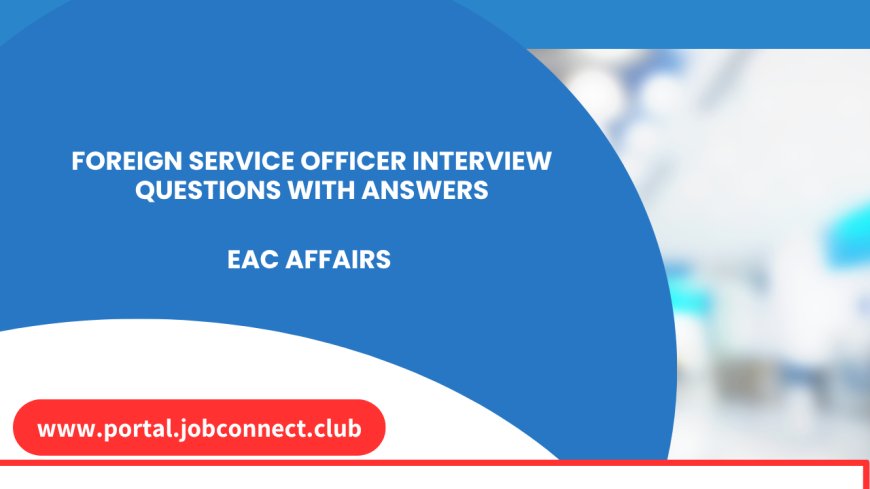foreign service officer interview questions with answers EAC Affairs

Section 4: EAC Affairs (40 MCQs)
1. The EAC Summit meets:
A) Biannually
B) Only during crises
C) Every 5 years
D) Weekly
✅ A
2. Tanzania's main export to EAC is:
A) Natural gas
B) Manufactured goods
C) Agricultural products
D) Arms
✅ C
3. The EAC Common External Tariff is set by:
A) Each member state independently
B) The Customs Union Commission
C) UNCTAD
D) Private sector
✅ B
4. The EAC Treaty was signed in:
A) 1995
B) 1999
C) 2000
D) 2005
✅ B
5. The Secretariat of the EAC is based in:
A) Nairobi
B) Arusha
C) Kigali
D) Kampala
✅ B
6. The highest decision-making body of the EAC is:
A) Council of Ministers
B) EAC Secretariat
C) EAC Summit
D) EALA
✅ C
7. EAC integration pillars include all EXCEPT:
A) Political Federation
B) Customs Union
C) Military Alliance
D) Common Market
✅ C
8. Which of these is an EAC institution?
A) East African Court of Justice
B) African Union Commission
C) COMESA Council
D) SADC Tribunal
✅ A
9. Tanzania joined the re-established EAC in:
A) 1977
B) 1985
C) 2000
D) 2001
✅ C
10. Free movement within EAC includes:
A) Goods and capital only
B) Persons, goods, services, and capital
C) Only citizens with visas
D) Vehicles and aircraft
✅ B
11. The EALA stands for:
A) East Africa Local Authority
B) East African Legislative Assembly
C) East Africa Legal Association
D) East Africa Legal Aid
✅ B
12. Which country is NOT currently an EAC member (as of 2025)?
A) Burundi
B) DRC
C) Ethiopia
D) South Sudan
✅ C
13. The EAC Customs Union aims to:
A) Abolish internal tariffs
B) Eliminate citizenship
C) Ban cross-border trade
D) Increase import taxes
✅ A
14. Tanzania’s representation at the EAC is managed through:
A) The Ministry of Health
B) The Ministry of Foreign Affairs and East African Cooperation
C) The Judiciary
D) The Ministry of Tourism
✅ B
15. EAC citizens can reside in other member states under:
A) Political federation clause
B) Common Market Protocol
C) Custom Union Act
D) Military agreements
✅ B
16. EAC partner states include:
A) 3
B) 5
C) 7
D) 10
✅ C (As of 2025: Tanzania, Kenya, Uganda, Rwanda, Burundi, South Sudan, DRC)
17. Which of the following is a challenge to EAC integration?
A) Shared legal frameworks
B) Language diversity and policy harmonization
C) Free movement protocols
D) Common currency implementation
✅ B
18. The EAC passport allows:
A) Intercontinental travel
B) Movement across member states
C) Permanent settlement in EU
D) Driving licenses
✅ B
19. Tanzania’s role in the EAC includes:
A) Hosting the Secretariat
B) Chairing the AU
C) Setting global fuel prices
D) Leading UN peacekeeping
✅ A
20. The Council of Ministers in the EAC comprises:
A) Heads of State
B) Ministers from Partner States
C) EALA members
D) Chiefs of Defense
✅ B
21. The EAC aims to implement a single currency by:
A) 2015
B) 2024
C) 2030
D) 2050
✅ C
22. The protocol for the East African Monetary Union was signed in:
A) 2000
B) 2005
C) 2013
D) 2020
✅ C
23. Which sector is prioritized for harmonization in EAC?
A) Oil pricing
B) Immigration policies
C) Education standards
D) Military operations
✅ C
24. EAC member states contribute financially to:
A) Local district budgets
B) The EAC budget
C) SADC
D) The African Development Bank
✅ B
25. The East African Court of Justice settles:
A) Marriage disputes
B) Trade and treaty conflicts among member states
C) Local government issues
D) Labor strikes
✅ B
26. Trade disputes within EAC are resolved by:
A) WTO
B) The host country’s judiciary
C) EAC Dispute Resolution Mechanisms
D) The ICC
✅ C
27. The Common Market Protocol was adopted in:
A) 1999
B) 2005
C) 2010
D) 2015
✅ C
28. DRC joined the EAC in:
A) 2015
B) 2019
C) 2022
D) 2024
✅ C
29. Non-Tariff Barriers (NTBs) are discouraged because they:
A) Increase regional cooperation
B) Hinder free trade
C) Promote tourism
D) Support poor countries
✅ B
30. Who coordinates EAC implementation at the national level in Tanzania?
A) Local government councils
B) Ministry of Foreign Affairs and East African Cooperation
C) Ministry of Education
D) Regional police
✅ B
31. Which document governs the EAC?
A) AU Charter
B) COMESA Act
C) EAC Treaty
D) WTO Convention
✅ C
32. The EAC Vision 2050 emphasizes:
A) Armed conflict
B) Regional integration and prosperity
C) Independence of nations
D) Resource isolation
✅ B
33. A Tanzanian citizen working in Uganda needs:
A) A work permit only
B) EAC travel card
C) Valid passport and right to work under the Common Market
D) Refugee status
✅ C
34. Key EAC programs include all EXCEPT:
A) Infrastructure development
B) Health sector collaboration
C) Cultural festivals
D) Space exploration
✅ D
35. Cross-border infrastructure development promotes:
A) Segregation
B) Integration and trade
C) Inflation
D) Political instability
✅ B
36. The EAC regional industrialization strategy promotes:
A) Informal economy
B) Rural to urban migration
C) Value addition and job creation
D) Currency inflation
✅ C
37. EAC’s legal instrument for cooperation is the:
A) Treaty
B) Constitution
C) Budget
D) Manifesto
✅ A
38. The EAC Headquarters in Arusha hosts:
A) Summit only
B) All EAC organs
C) The East African Court only
D) Political parties
✅ B
39. EAC integration aims to benefit:
A) Only large companies
B) Citizens of all member states
C) Non-member states
D) Tourists
✅ B
40. The role of Tanzania’s National Focal Point for EAC is to:
A) Monitor border crimes
B) Lead military drills
C) Coordinate national implementation of EAC decisions
D) Issue travel advisories
✅ C